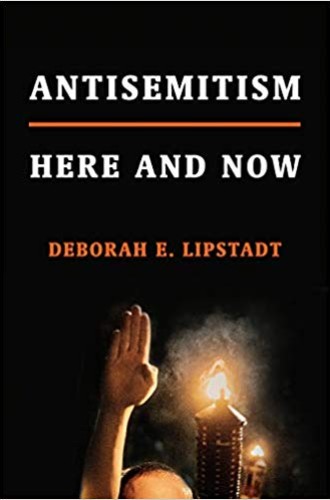Why I'm reading Deborah Lipstadt
I never thought that in 2019 a book on antisemitism in America would be vital reading.
Antisemitism used to be something I could joke about. The family who said they experienced it everywhere they went was bizarre; we laughed and attributed to their oddities the prejudice they believed they encountered. Growing up, I’d heard plenty of stories from my grandparents about their encounters with it and a few isolated ones from my parents. I never thought that in 2019 a book about antisemitism in America would be vital reading.
Antisemitism: Here and Now is by Deborah Lipstadt, a Holocaust historian at Emory University best known for the libel suit against her brought by British Holocaust denier David Irving. Lipstadt won the case in 2000 and was played by Rachel Weisz in the 2016 movie Denial. As historian Jamil Zainaldin wrote about the case, what was on trial was “the profession of history, the methods and standards of scholarship, and scholarship's main objective: to find and reveal the truth.” This is also Lipstadt’s objective.
The book is written as a series of friendly letters to two figures: a young Jewish former student who encounters antisemitism in various guises and a sympathetic non-Jewish colleague who wants to understand the strange persistence of antisemitism through history. The framing device works well as a way of organizing the material and making the tone of the writing personal. The epistolary form also allows Lipstadt to record and respond to multiple views.
As she says in the introduction, she did not write the book because of an alarming rise in antisemitic incidents. (The manuscript was completed well before the worst antisemitic attack on American soil occurred in my own Pittsburgh synagogue on October 27, 2018.) She wrote the book because of her alarm that “human beings continue to believe in a conspiracy that demonizes Jews and sees them as responsible for evil.” This belief is entirely fictional, and it is problematic because “no healthy society harbors extensive antisemitism—or any other form of hatred.”
Lipstadt offers a comprehensive history of antisemitism from ancient times to the present day. She veers from discussing why she uses a non-capitalized and non-hyphenated spelling of the word (“antisemitism is an illogical, delusional passion full of self-contradictions and absurd contentions” that “doesn’t deserve the dignity of capitalization”) to why she believes certain politicians function effectively as “dog whistles,” calling out to antisemites and giving them permission to act as they will.
In the book’s seven sections, she covers the topics she regards as most significant for understanding what antisemitism is and why it persists. Her discussion ranges from holocaust denial to antisemitic campus activism, from language that toxifies Israel to “the dinner party antisemite and the clueless anti-Semite.” Because the book is written as a dialogue, Lipstadt has the space to create arguments and then tear them down.
Lipstadt also addresses common questions. Since antisemitic stereotypes and attitudes have been so prevalent throughout history, does this mean there must be a ring of truth to them? (No. Antisemitism exists because it benefits people—and the oppression of Jews also benefits those who oppress other groups of people.) Since the Jewish population in Europe is currently so small, can there even be such a thing as antisemitism there? (Yes.)
Lipstadt is a teacher at heart: she writes in a way that is engaging, clear, and accessible. She says in the introduction that she has written the book to “explore a perplexing and disturbing set of circumstances,” and in that task she has succeeded. She also states her hope that the book “will provoke action. What precisely that action is remains in the hand of the reader.”





